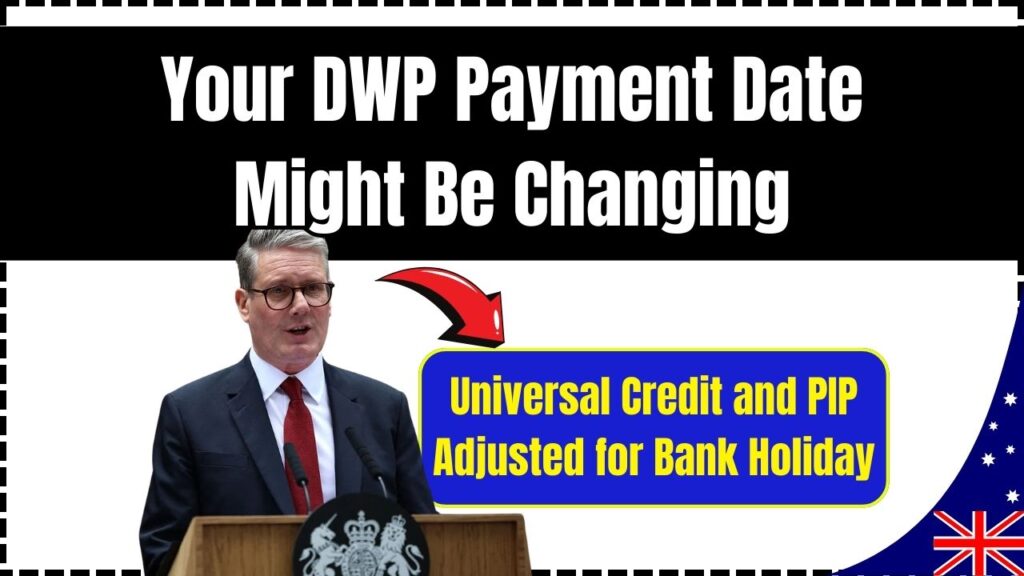Your DWP Payment Date Might Be Changing: If you receive benefits such as Universal Credit, Personal Independence Payment (PIP), or the State Pension, it’s essential to be aware of upcoming changes to your payment schedule in May 2025. Due to two UK bank holidays, the Department for Work and Pensions (DWP) and HM Revenue and Customs (HMRC) have announced early payment dates to ensure you receive your funds without delay.
Your DWP Payment Date Might Be Changing
Understanding the changes to benefit payment dates in May 2025 is essential for effective financial planning. With early payments scheduled due to bank holidays and recent increases in benefit amounts, staying informed will help you manage your finances more effectively.

| Change | Details |
|---|---|
| Early May Bank Holiday | Payments due on Monday, 5 May 2025, will be made on Friday, 2 May 2025. |
| Spring Bank Holiday | Payments due on Monday, 26 May 2025, will be made on Friday, 23 May 2025. |
| Benefits Affected | Universal Credit, PIP, State Pension, Child Benefit, Carer’s Allowance, ESA, JSA, and more. |
| Benefit Increases (April 2025) | Most benefits increased by 1.7%; State Pension increased by 4.1%. |
| Universal Credit Deduction Cap | Reduced from 25% to 15% of the standard allowance as of 30 April 2025. |
| Tax Credits | No new claims accepted from 5 April 2025; transition to Universal Credit underway. |
| Official Resources | GOV.UK: How and when your benefits are paid |
Understanding DWP Payment Date Might Be Changing
Why Are Payments Being Made Early?
In the UK, when a scheduled benefit payment date falls on a bank holiday, the payment is typically made on the working day before to ensure recipients have access to their funds without delay. In May 2025, there are two such bank holidays:
- Early May Bank Holiday: Monday, 5 May 2025
- Spring Bank Holiday: Monday, 26 May 2025
As a result, if your usual payment date falls on either of these Mondays, you will receive your payment early, on the preceding Friday.
Which Benefits Are Affected?
The early payment dates apply to a range of benefits, including:
- Universal Credit
- Personal Independence Payment (PIP)
- State Pension
- Child Benefit
- Carer’s Allowance
- Employment and Support Allowance (ESA)
- Jobseeker’s Allowance (JSA)
- Income Support
- Pension Credit
- Disability Living Allowance (DLA)
- Attendance Allowance
- Guardian’s Allowance
These adjustments ensure that recipients receive their payments without interruption during the bank holiday periods.
Benefit Increases and Policy Changes
April 2025 Benefit Increases
As of April 2025, the UK government implemented several benefit increases to help with the rising cost of living:
- Universal Credit: Increased by 1.7%. For example, the standard allowance for a single claimant aged 25 or over rose from £400.14 to £407.95 per month.
- State Pension: Increased by 4.1%, bringing the full new weekly payment to £230.25.
These increases aim to provide additional support to individuals and families across the UK.
Universal Credit Deduction Cap Reduced
Effective 30 April 2025, the maximum deduction from a claimant’s Universal Credit standard allowance has been reduced from 25% to 15%. This change is designed to ease financial pressure on claimants repaying debts, such as advance payments or overpayments.
Transition from Tax Credits to Universal Credit
From 5 April 2025, no new claims for Working Tax Credit or Child Tax Credit are being accepted. Current recipients will be gradually transitioned to Universal Credit. If you receive tax credits, you will be notified when it’s time to move to Universal Credit and will have three months to complete your application.
Practical Advice for Managing Early Payments
Budgeting Tips
Receiving your payment early means a longer gap until your next payment. To manage this:
- Plan Ahead: Create a budget that accounts for the extended period between payments.
- Prioritize Essentials: Ensure that funds are allocated to essential expenses like rent, utilities, and groceries.
- Seek Advice: If you’re struggling, organizations like Turn2Us and EntitledTo offer resources and calculators to help you manage your finances.
What to Do If Your Payment Is Missing?
If you haven’t received your payment as expected:
- Check Your Payment Date: Verify the scheduled payment date on your award notice or online account.
- Contact Your Bank: Ensure there are no issues on their end.
- Contact the Relevant Helpline:
- Universal Credit: 0800 328 5644
- PIP: 0800 121 4433
- State Pension: 0800 731 7898
Please note that helplines are closed on bank holidays but will be available on the preceding and following working days.
DWP £301–£500 Support Coming in 2025 – Check When Your Payment Lands!
DWP Set to End Four Legacy Benefits in May 2025 – Check Eligibility & Payment Date
DWP £11,900 Payment for Pensioners in May 2025 – Check If You Qualify Now
Frequently Asked Questions (FAQs)
Will My Payment Amount Change Because It’s Early?
No, the amount you receive will remain the same. Only the payment date is adjusted due to the bank holiday.
Do I Need to Take Any Action to Receive the Early Payment?
No action is required on your part. The DWP and HMRC will process the early payments automatically.
What If My Regular Payment Date Doesn’t Fall on a Bank Holiday?
If your scheduled payment date is not on a bank holiday, your payment will be made as usual without any changes.








